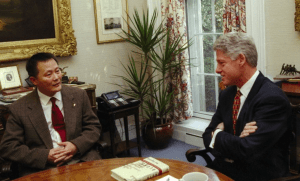Journal of Political Risk, Vol. 6, No. 5, May 2018

Chinese human rights activist Wei Jingsheng (left) and American politician US President Bill Clinton talk together in the White House, Washington DC, December 8, 1997. Source: White House Press.
Wei Jingsheng (魏京生)
Wei Jingsheng (魏京生) was the most famous Chinese dissident in 1979, when Deng Xiaoping put him on a nationally televised trial for writing the essay, “The Fifth Modernization: Democracy.” He received 15 years in prison. After meeting with President Clinton’s Assistant Secretary for Human Rights in 1993, he was put back in jail for another 14 years. He served 4 years of his second jail term before being exiled to the United States in 1997. A number of points are new in his latest article, published in English for the first time here. In particular, the discussion of China’s President Xi obstructing the Trump/Kim summit has very serious implications for the future of U.S.-China relations, and the credibility of President Xi as an interlocutor in Korean peace negotiations. Wei Jingsheng’s piece was originally published on Radio Free Asia’s blog and dated May 17, 2018. The article, including its Beijing slang, has been translated into English below.




